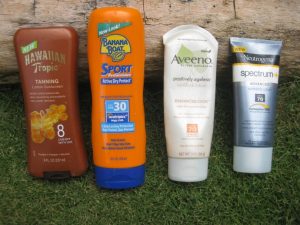Legislation to Study Impacts of Sunscreen Chemicals on Coral Reefs
Sens. Mazie K. Hirono and Jeff Merkley (D-Ore.) introduced legislation on Wednesday, May 8, 2019, to better inform the public about the effects that sunscreen chemicals have on coral reefs around the world. The Oxybenzone and Octinoxate Impact Study Act of 2019 would require the Environmental Protection Agency (EPA) to study the impacts of oxybenzone and octinoxate, two key chemicals found in sunscreen, on human health and the environment.
“In Hawai‘i, we understand that our way of life depends on a healthy ocean,” Sen. Hirono said. “We cannot afford to continue losing our coral reefs, which are suffering from a number of threats such as warmer temperatures, more acidic waters, and disease, and that is why Hawai‘i has become a leader in taking steps to mitigate the harmful impacts of sunscreen on our marine environment. This bill, which requires a study on the human and environmental impacts of common sunscreen ingredients, will help inform the national discussion on actions needed to protect our oceans.”
“While sun protection is incredibly important, we need to take action if these chemicals are harming human health or our environment,” Sen. Merkley said. “Understanding the full impact of these chemicals on our bodies and on marine life is a critical first step to making sure that we aren’t inadvertently putting ourselves or our planet in danger when we put on sunscreen for a day at the beach.”
The Oxybenzone and Octinoxate Impact Study Act would require the EPA to study the impacts of oxybenzone and octinoxate on human health and the environment and require the findings be provided to Congress and the public within 18 months. By conducting a comprehensive study on these two chemicals, the EPA will be able to better determine the impact these chemicals have on both human health and marine life, and what steps can be taken to prevent further damage to aquatic environments.
In July 2018, Gov. David Ige signed a bill that bans the sale of sunscreens containing oxybenzone and octinoxate in Hawai‘i beginning in 2021. This bill made Hawai‘i the first state to ban the sale of sunscreens containing these two chemicals and shortly after, the Republic of Palau and city of Key West, Florida also took action to ban sunscreens containing chemicals that are potentially harmful to marine life. More research is needed, but studies have linked these ingredients to harming coral by causing bleaching, disease, and damage to DNA, as well as decreasing fertility in fish, impairing algae growth, inducing defects in mussel and sea urchin young, and accumulating in the tissues of dolphins. Just last month water tests showed extremely high concentrations of oxybenzone in a popular snorkeling area near Kona.















